UK Immigration 2026: Important Points-Based Reforms Explained
As the United Kingdom prepares for 2026, the Home Office is planning significant updates to the Points-Based Immigration System (PBS) — a framework that shapes how foreign nationals study, work, and settle in the UK.
These changes aim to streamline visa processing, tighten eligibility for certain routes, and modernize digital border control systems under the government’s Future Borders and Immigration Strategy.
Let’s dive deep into what’s expected in 2026, how these reforms may affect skilled workers, students, and employers, and what global migrants need to prepare for.
The UK Immigration 2026 Points-Based System
Introduced in 2020 after Brexit, the UK’s Points-Based Immigration System replaced the EU’s free movement rules and set objective criteria for non-UK nationals seeking entry.
Applicants are awarded points based on factors like:
- Job offer from an approved employer
- Skill level
- English proficiency
- Salary threshold
- Education and experience
To qualify for most visas, an applicant must achieve at least 70 points.
In 2026, the Home Office intends to refine these criteria to make the system both fairer and more efficient.
1. Reforming the Points Allocation Framework
What’s Changing:
The UK government plans to adjust the weighting of skill, salary, and shortage occupation points.
- Higher points for STEM and critical industries
- New incentives for healthcare, AI, and green energy sectors
- Lower emphasis on salary-only thresholds for essential roles
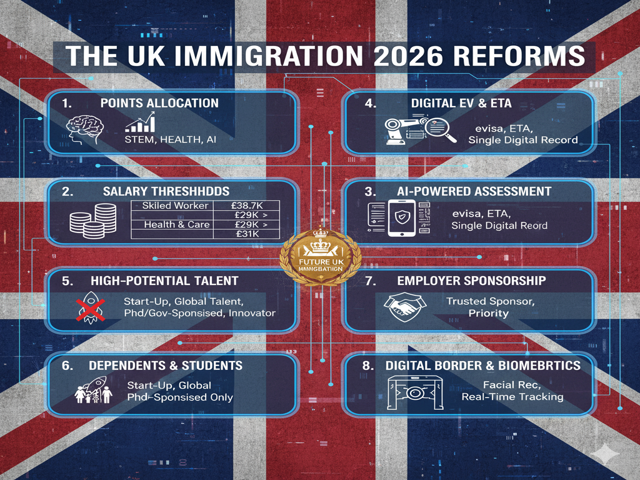
The goal is to encourage innovation and attract workers with future-ready skills rather than purely high-income earners.
2. Higher Salary Thresholds for Skilled Workers
Following the 2025 salary threshold increase, further adjustments are planned for April 2026 to reflect inflation and labor market needs.
Expected Salary Changes:
| Visa Category | 2025 Minimum Salary | 2026 Proposed |
|---|---|---|
| Skilled Worker | £38,700 | £42,000 |
| Health & Care Worker | £29,000 | £31,000 |
| ICT (Intra-Company) Transfer | £45,800 | £48,000 |
This means applicants will need higher job offers to qualify — especially in non-shortage sectors.
3. AI-Powered Visa Assessment & Automation
The UK is investing in AI-driven decision systems to process visa applications more efficiently.
The 2026 plan includes:
- Digital document verification via secure data-sharing platforms
- AI-assisted fraud detection
- Predictive analytics for faster eligibility checks
Applicants will benefit from faster turnaround times and reduced manual paperwork.
4. Integration with eVisa and ETA Systems
By 2026, the UK aims to completely replace physical visa vignettes with digital eVisas.
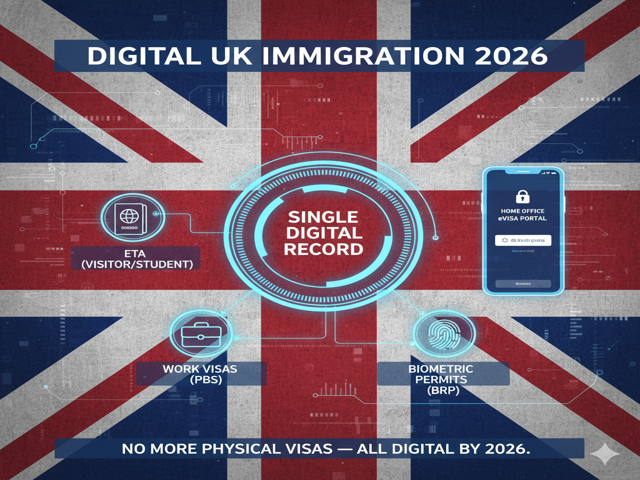
The new digital immigration system will connect:
- Visitor & Student routes (ETA)
- Work visas (PBS categories)
- Biometric Residence Permits (BRPs)
This integration means every traveler will have a single digital record, viewable through the Home Office eVisa portal.
5. New Pathways for High-Potential and Start-Up Talent
Under the UK Innovation Strategy, 2026 will see an expansion of the:
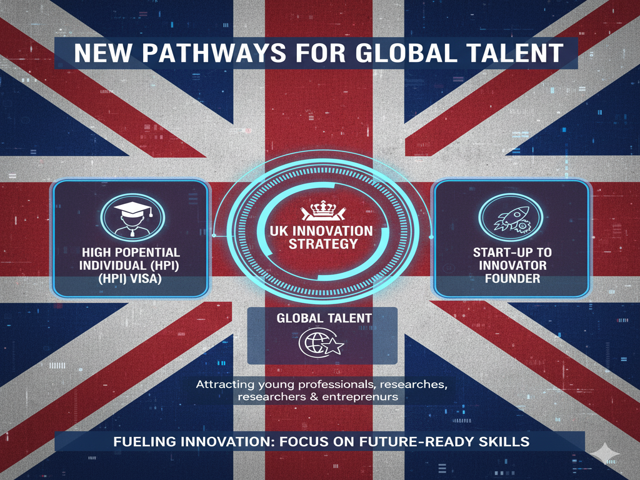
- High Potential Individual (HPI) Visa
- Global Talent Visa
- Start-Up to Innovator Founder transition
The focus is to attract young professionals, researchers, and entrepreneurs from top global universities and emerging tech hubs.
6. Tightened Rules for Dependents & Students
The 2026 reforms are expected to further limit dependent eligibility for student and post-graduate routes.
- Dependents will only be allowed for PhD-level or government-sponsored courses.
- Stricter financial evidence will be required to prove self-sufficiency.
- Some dependent routes may shift to a sponsorship-based model.
These changes align with the UK’s target to reduce net migration while protecting its education sector’s integrity.
7. Employer Sponsorship Reforms
The Skilled Worker sponsorship process is also being redesigned:
- Simplified sponsor license renewals
- Stricter compliance monitoring
- Digital “trusted sponsor” rating system
Employers with a strong compliance record will gain access to priority visa processing and reduced documentation.
8. Digital Border & Biometric Upgrades
Under the Future Borders Programme, the UK will introduce:
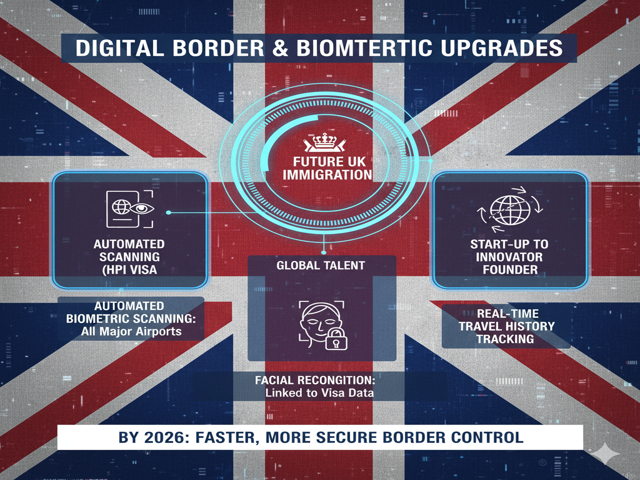
- Automated biometric scanning at all major airports
- Facial recognition linked to visa data
- Real-time travel history tracking
By 2026, border control will become fully digital, ensuring both speed and security.
Source: Official UK Government Immigration Reforms 2026
Timeline of Reforms (2025–2026)
| Year | Reform Focus | Status |
|---|---|---|
| 2025 | Salary threshold increases | Implemented |
| Early 2026 | Points allocation restructure | Pending |
| Mid-2026 | Digital visa rollout (eVisa) | Testing phase |
| Late 2026 | Student & dependent reforms | Expected launch |
Expert Opinions
“These reforms will create a smarter, faster, and fairer immigration system — balancing talent attraction with border integrity.”
— UK Home Office spokesperson, February 2025
“For employers, the changes simplify recruitment but raise wage obligations.”
— British Chambers of Commerce report, 2025
Impact on Employers and Migrants
For Employers:
- Need to review salary bands and sponsorship duties.
- Ensure HR compliance for digital record systems.
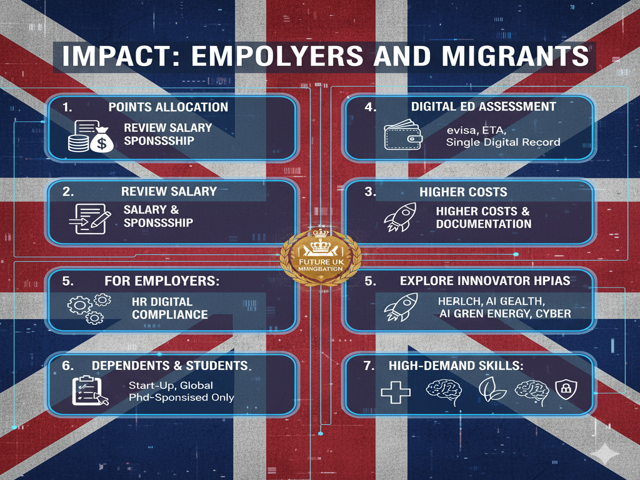
For Migrants:
- Prepare for higher costs and stricter documentation.
- Explore alternative visas (e.g., HPI, Innovator Founder).
Skilled professionals in health, AI, green energy, and cybersecurity will remain in high demand.
Read Also: UK Skilled Worker Visa 2025: Salary Threshold Increases
FAQs: UK Immigration 2026 Reforms
Q1. When will the 2026 immigration reforms take effect?
The changes will be rolled out gradually from April to December 2026.
Q2. Will the new points system affect current visa holders?
Current visa holders will not lose status but must meet new criteria for extensions.
Q3. Are salary thresholds increasing again?
Yes, thresholds for most skilled roles will rise to match inflation and skill demand.
Q4. What sectors benefit the most?
STEM, healthcare, renewable energy, AI, and engineering sectors.
Q5. Will dependents still be allowed for students?
Only for PhD or government-funded students under new 2026 rules.
Agent Advise – UK Immigration 2026
The UK Immigration 2026 Points-Based System Reforms mark a pivotal shift toward a more intelligent, digital, and selective immigration framework.
While these changes will make the UK a magnet for skilled professionals, they also demand greater preparation and higher qualification from applicants.
Employers, universities, and migrants alike should begin adapting early — ensuring compliance with salary thresholds, eVisa systems, and dependent restrictions.
The future of UK immigration is digital, data-driven, and opportunity-focused.



